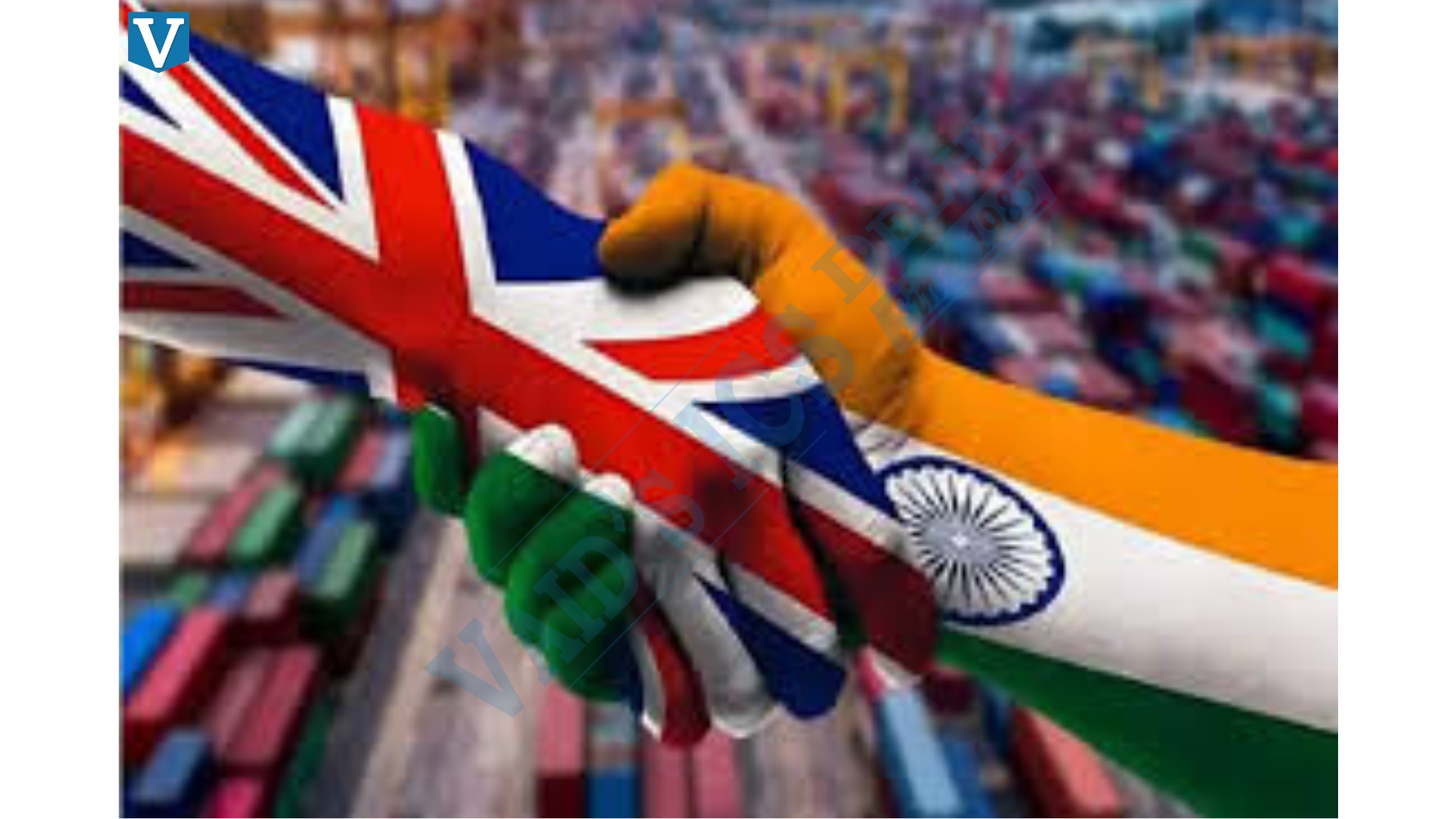India–UK Ties: Much to Build On
Indian Express

Key Arguments
- Renewed Political Consensus
○ The India–UK Free Trade Agreement (FTA) enjoys bipartisan political support in the UK, ensuring policy continuity despite leadership transitions.
○ The Vision 2035 document institutionalizes cooperation beyond trade, covering defence, innovation, education, and climate action. - Economic Synergy
○ Bilateral trade stands at ~$20 billion, with the FTA expected to boost investments, exports, and job creation.
○ The partnership promises greater access to markets, particularly in IT, pharmaceuticals, textiles, and financial services. - Defence and Security Cooperation
○ Strengthening of joint defence manufacturing, maritime cooperation, and cybersecurity frameworks.
○ Focus on technology transfer, intelligence exchange, and supply chain resilience in Indo-Pacific stability. - Education and Innovation Collaboration
○ Academic partnerships through India–UK Science & Innovation Council (SIC) and mutual recognition of qualifications.
○ Promotes research exchanges, scholarships, and innovation hubs linking universities and industries. - Cultural and People-to-People Relations
○ India’s 1.7 million-strong diaspora in the UK serves as a cultural bridge.
○ Initiatives in film co-production, tourism, and skill mobility strengthen socio-cultural ties.
Author’s Stance
● The author, Subhrali Roy, adopts an optimistic and pragmatic stance, viewing India–UK cooperation as a mutually reinforcing strategic partnership.
● Tone is forward-looking, framing the FTA as the cornerstone of a broader alliance across economics, technology, and security.
● Emphasizes shared democratic values and mutual economic benefit as foundations for long-term stability.
Possible Biases
● Pro-Western and Governmental Bias: Reflects official diplomatic optimism, underplaying contentious issues like visa rules, post-Brexit labour constraints, and migration bottlenecks.
● Economic Optimism Bias: Assumes automatic job creation and growth without analyzing regulatory asymmetries or trade protectionism.
● Strategic Silence: Skips discussion on geopolitical divergences — e.g., India’s ties with Russia vs. UK’s NATO commitments.
Pros
● Economic Diversification: Strengthens India’s post-Brexit trade footprint in Europe.
● Defence Modernization: Boosts Atmanirbhar Bharat via joint manufacturing and R&D.
● Educational Gains: Expands mobility, innovation, and global exposure for Indian youth.
● Strategic Depth: Enhances Indo-Pacific security cooperation and supply chain resilience.
● Cultural Diplomacy: Leverages diaspora strength and cultural exports to deepen goodwill.
Cons
● Unequal Trade Benefits: The UK may gain quicker access to India’s services market, while Indian exports face tariff and mobility barriers.
● IP and Regulatory Issues: UK’s stringent IP norms could impact Indian pharma and manufacturing.
● Geopolitical Ambiguity: Post-Brexit shifts may alter long-term policy commitment toward the Indo-Pacific.
● Implementation Uncertainty: The UK’s economic slowdown could delay FTA execution.
● Regulatory Gaps: Divergent standards in food safety, e-commerce, and data protection complicate negotiations.
Policy Implications
1. Economic Policy (GS Paper III):
○ Negotiate balanced FTA terms safeguarding domestic sectors like dairy, textiles, and automobiles.
○ Encourage bilateral investments in green energy, fintech, and digital trade.
2. Strategic Policy (GS Paper II):
○ Expand joint military exercises, maritime security, and defence R&D partnerships under the Indo-Pacific framework.
3. Education & Innovation (GS Paper II):
○ Scale up collaboration between IITs and UK universities in research, AI, and climate tech.
4. Cultural Diplomacy (GS Paper I):
○ Strengthen soft power ties via media, arts, and student-exchange programs.
5. Connectivity & Logistics (GS Paper III):
○ Improve aviation, port connectivity, and digital trade infrastructure for smoother bilateral commerce.
Real-World Impact
● Economic: Potential to generate millions of jobs across sectors; boost Indian exports and investments.
● Strategic: Enhances India’s position in Indo-Pacific security and global power rebalancing.
● Educational: Increases academic collaboration, skill exchange, and innovation networks.
● Geopolitical: Strengthens India’s Western alliances, balancing China’s economic and military influence.
Relevance to UPSC GS Papers
|
Paper |
Theme & Relevance |
|
GS Paper I (Culture & Society) |
Cultural diplomacy, diaspora role, and historical legacy of India–UK ties. |
|
GS Paper II (IR & Governance) |
Bilateral trade negotiations, defence cooperation, Indo-Pacific strategy. |
|
GS Paper III (Economy) |
FTA impacts on trade, investment, and technology transfer. |
|
GS Paper IV (Ethics) |
Ethical dimensions of global equity, cooperation, and mutual trust in diplomacy. |
Balanced Summary and Future Perspectives
The editorial situates India–UK relations at a transformative juncture, where trade is not merely transactional but strategic and multidimensional. The FTA, once finalized, could redefine the partnership under the Vision 2035 framework — spanning economy, defence, education, and innovation.
Yet, the partnership must navigate asymmetric trade gains, visa constraints, and policy implementation risks.
Future Outlook:
● FTA Finalization: Fast-track negotiations with pragmatic concessions.
● Technology & Green Innovation: Focus on AI, renewable energy, and cybersecurity collaboration.
● Mobility & Migration Reform: Ensure reciprocal ease of student and work visas.
● Diaspora Engagement: Use the Indian community in the UK as an economic and cultural catalyst.
● Strategic Stability: Balance cooperation despite differing stances on global conflicts.
Final Takeaway
India–UK relations are evolving from a post-colonial equation to an equal, innovation-driven partnership.
The FTA, if executed with equity and foresight, can anchor a 21st-century alliance that blends economic pragmatism, shared democratic values, and strategic autonomy — redefining India’s place in global diplomacy.
